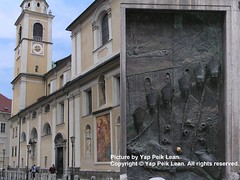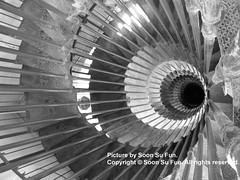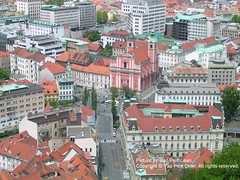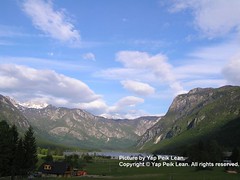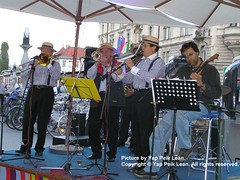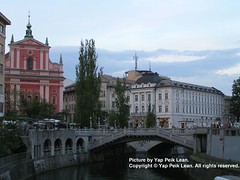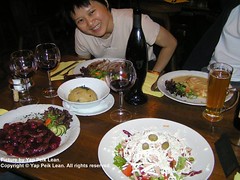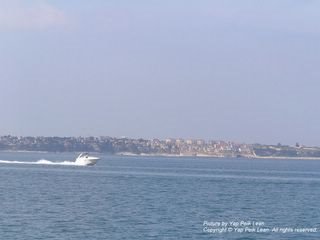We decided to drive up to Bled and then take a pletna (a large gondola hand-propelled by a boatman) or hire a boat to row to Bled Island, which is situated right in the middle of Lake Bled. By the time we arrived in Bled, it started drizzling and I saw my plans going up in smoke.
Of all the bright ideas, we next decided to outrun the rain. Since we noted that the border of Austria was about an hour’s drive away, we took the opportunity to drive across yet another border. In true jet setting fashion, we hopped across to south of Austria for lunch and then back again to Slovenia thereafter! Except that we were nothing like the jet setting crowd, with our casual backpackers’ attires of t-shirt and jeans!
A quaint little town at the south of Austria
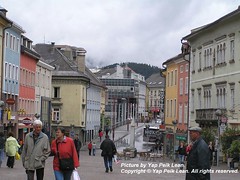
Austria would not be Austria without
the required picturesque mountains
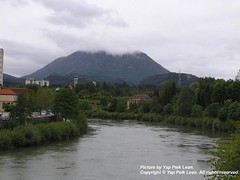
Modern day backpacking jet setters in
a typical Austrian restaurant
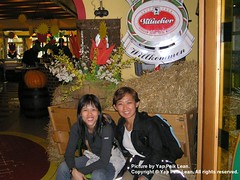
Thank god the sky cleared up when we returned to Bled. Woo hoo! We were all ready for the pletna to Bled Island. But alas! The boatman wanted to charge us an arm and a leg for that short distance to the island ~ “short” in our perspective prior to trying our hand at rowing the boat across the lake. Being “cheap” and “poor”, we refused to part with our Tolars and elected the alternative of hiring a rowing boat and rowing ourselves to the island.
Despite the rain letting up, the lake remained choppy. We watched a few gwei los attempting to row across to the island but after 10-15 minutes of rowing but not actually moving from the same spot, they gave up! Boat rental were charged by the hour but we negotiated with the boat owner to pay a flat fee of one hour rental; which he agreed because he thought we would not be able to make it there at all, just as the gwei los could not. Ahh … but he underestimated us as we have an ace in our pocket i.e. Cecile Deforge to the rescue!
Cecile to the rescue!
She is one hell of a boat rower!
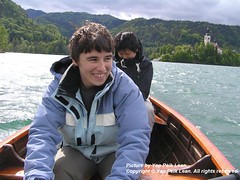
Bled Island ~ our destination!
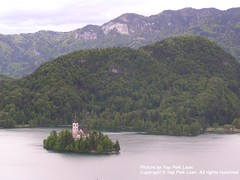
Only attraction on Bled Island
~ the church!
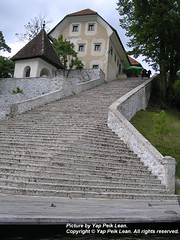
The surrounding alps
~ picture taken from Bled Island
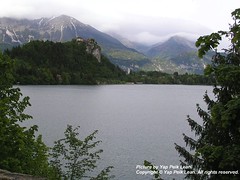
It was evening by the time we left Bled Island. Once back to the mainland, we made our way to Bled Castle (which can be seen from the above picture) to get a bird’s eye view of Bled itself.
A bird’s eye view of Bled,
taken from Bled Castle
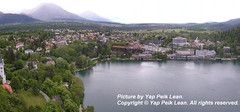
Fact sheet on Bled from www.lonelyplanet.com
Bled's quintessentially medieval castle was the seat of South Tyrolian bishops for over 800 years and was later used as a summer residence by the Yugoslav royal family. Set atop a steep cliff above Lake Bled, the castle has great views. A small museum within peeks into the area's history through a manly collection of swords and armour. On Bled Island, at the western end of the lake, is a white 15th century belfry with a 'bell of wishes'. It's said that anyone who rings the bell will get what they wish for; naturally everyone and their Slavic grandmother rings it over and over again.
